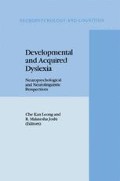Abstract
In the alexia literature it is assumed that educated normals do not make reading errors. When the possibility that they do is brought to their attention, however, normal adult readers can indeed notice and identify reading errors. They find themselves retracing their steps when a word or word-string appears non-sensical. Two neurologically normal subjects collected 573 such ‘slips of the eye’ over the course of approximately one year. Errors were from newspapers and magazines; the subjects tore out the page with the target, circling it and writing the error. Errors were classified post-hoc into two major categories; about two-thirds were single word substitutions (e.g., “Adriatic” read as “Atlantic”), and the remainder consisted of heterogeneous errors, which were further subdivided. These data were not immediately comparable to those of brain-damaged patients because we looked at words in discourse context. However, for the single word substitution errors, with the exception of homonyms, there were no categories we found for these normals that have not been reported in brain-damaged patients. The data pattern suggests that normal adults employ an interactive approach in the task of silent reading. The variety and nature of the errors observed imply the availability and use of both top-down and bottom-up reading strategies.
Access this chapter
Tax calculation will be finalised at checkout
Purchases are for personal use only
Preview
Unable to display preview. Download preview PDF.
References
Caplan, D.: 1987, Neurolinguistics and Linguistic Aphasiology, Cambridge University Press, Cambridge.
Caramazza, A.: 1986, ‘On drawing inferences about the structure of normal cognitive systems from the analysis of patterns of impaired performance: The case for single patient studies’, Brain and Cognition 5, 41–66.
Coltheart, M.: 1980, ‘Deep dyslexia: A review of the syndrome’, in M. Coltheart, K. Patterson and J. C. Marshall (eds.), Deep Dyslexia, Routledge & Kegan Paul, London, pp. 22–47.
Coltheart, M., Masterson, J., Byng, S., Prior, M. and Riddoch, J.: 1983, ‘Surface dyslexia’, Quarterly Journal of Experimental Psychology 35A, 469–495.
Goodman, K. S.: 1970, ‘Reading: A psycholinguistic guessing game’, in H. Singer and R. B. Ruddell (eds.), Theoretical Models and Processes of Reading, International Reading Association, Newark DE, pp. 497–508.
Gough, P. B.: 1972, ‘One second of reading’, in J. F. Kavanagh and I. G. Mattingly (eds.), Language by Ear and by Eye, MIT Press, Cambridge MA, pp. 331–358.
LaBerge, D. and Samuels, S. J.: 1974, ‘Toward a theory of automatic information processing in reading’, Cognitive Psychology 6, 293–324.
Marshall, J. C.: 1982, ‘What is a symptom complex?’, in A. Arbib, D. Caplan and J. C. Marshall (eds.), Neural Models of Language Processes, Academic Press, New York, pp. 389–409.
Marshall, J. C.: 1986, ‘The description and interpretation of aphasic language disorders’, Neuropsychologia 24, 5–24.
Marshall, J. C. and Newcombe, F.: 1973, ‘Patterns of paralexia: A psycholinguistic approach’, Journal of Psycholinguistic Research 2, 175–199.
Newcombe, F. and Marshall, J. C.: 1985, ‘Reading and writing by letter sounds’, in K. E. Patterson, J. C. Marshall and M. Coltheart (eds.), Surface Dyslexia, Lawrence Erlbaum, London, pp. 35–51.
Schwartz, M. F., Saffran, E. M. and Marin, O. S. M.: 1980, ‘Fractionating the reading process in dementia: Evidence for word-specific print-to-sound associations’, in M. Coitheart, K. Patterson and J. C. Marshall (eds.), Deep Dyslexia, Routledge & Kegan Paul, London, pp. 259–269.
Smith, F.: 1971, Understanding Reading, Holt, Rinehart & Winston, New York.
Smith, F. and Holmes, D. L.: 1971, ‘The independence of letter, word, and meaning identification in reading’, Reading Research Quarterly 6, 394–415.
Stanovich, K. E.: 1980, ‘Toward an interactive-compensatory model of individual differences in the development of reading fluency’, Reading Research Quarterly 16, 32–71.
Editor information
Editors and Affiliations
Rights and permissions
Copyright information
© 1995 Springer Science+Business Media Dordrecht
About this chapter
Cite this chapter
Kaufman, R.C., Obler, L.K. (1995). Classification of Normal Reading Error Types. In: Leong, C.K., Joshi, R.M. (eds) Developmental and Acquired Dyslexia. Neuropsychology and Cognition, vol 9. Springer, Dordrecht. https://doi.org/10.1007/978-94-017-1241-5_10
Download citation
DOI: https://doi.org/10.1007/978-94-017-1241-5_10
Publisher Name: Springer, Dordrecht
Print ISBN: 978-90-481-4473-0
Online ISBN: 978-94-017-1241-5
eBook Packages: Springer Book Archive

